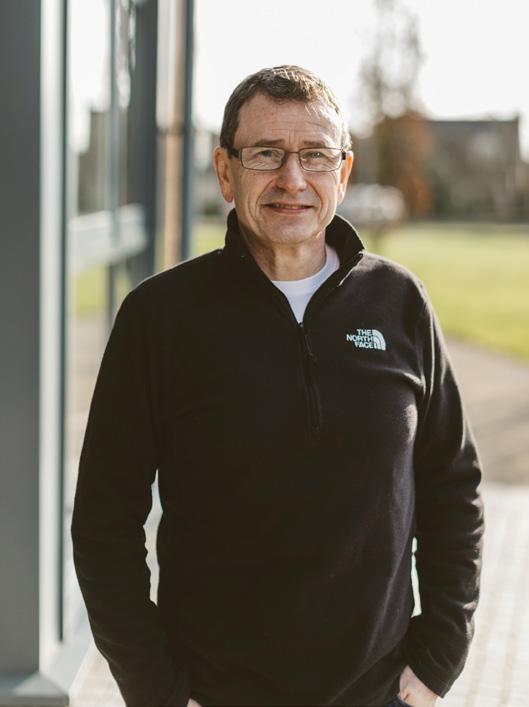
10 minute read
The pain of infertility
Deborah Sloan looks at the pain that infertility causes and speaks to one Presbyterian couple who bravely share their experiences. She also interviews Rev Alistair Bates on his research into involuntary childlessness within PCI.
When Paula and Andrew eloped to New York to get married six years ago, after meeting through their jobs as civil servants, they decided they wanted to start a family straight away.
A few months later, when things weren’t happening naturally for them, they went to see their doctor and were referred to hospital for further investigation. After waiting six months for an appointment and undergoing a series of tests, they were told there was no reason why they couldn’t get pregnant. Having then made the decision to progress with IVF and reached the top of the NHS waiting list in January 2020, they were hit by a further setback when Covid delayed treatment for 18 months. The couple have now been through two cycles of IVF, one funded on the NHS and one privately funded. Although embryos were successfully implanted, sadly both cycles ended in miscarriage.
It was during her darkest day last summer following their second loss that Paula felt God prompting her to share their story more widely within their church. Paula explains that she had taken herself off to bed one afternoon –something she didn’t normally do – and as she lay there for three hours, she had an overwhelming conviction that could only have come from God. She realised that not being able to have children was a taboo subject at church and even though it was a common real-life issue for many, it just wasn’t talked about. She fully appreciates that theirs is a very personal story of infertility, but she also believes that it is an important story of unanswered prayer that has relevance to so many other situations.
Paula and Andrew describe the last few years as a rollercoaster of emotions – from hope to despair, expectation to disappointment, joy to grief – and they want to be fully honest about the impact of this on their relationship with God. In the early stages of trying for a baby, they were open with family and close friends about their situation and asked them to pray for them. Andrew, in particular, was expectant that God would answer their prayer for a baby.
“I believed it was only a matter of time,” he says. “[I thought] ‘God’s going to come through for us’.” Paula remembers how they prayed on their knees for weeks, asking firstly that they could conceive naturally and then moving into praying more specifically that the IVF would be successful. But when the first IVF cycle didn’t work out as they had hoped, the couple admit that they hardened their hearts to God. Although they continued to attend church, Andrew stopped singing and didn’t read the Bible anymore. They found it increasingly difficult to be involved in family celebrations at church, particularly baptisms. Paula says she began to realise how quickly life moved on for other people and that she had nothing to look forward to. Paula is now in her early 40s and while it has always been a bit of a joke that she is older than Andrew, last August, she sat down with him and asked him did he want to leave the marriage as he could still have a chance with someone else.
When Paula and Andrew shared their story in Orangefield Presbyterian Church earlier this year, it was during a Sunday evening sermon series focusing on Psalm 23. ‘The Lord is my Shepherd’ holds special significance for Andrew as he turned to the words of the psalm when he found himself walking through a season of complete darkness. For most of his life, Andrew believes he had lived in a bubble. Everything had worked out as planned for him – job, car, marriage, house – and a baby was now the next thing on the list. But suddenly, his plans all fell apart and this led him into what he describes as “a year of real mental suffering”.
He explains that one day as he was driving to work “it was as if a switch flicked” and he was filled with an overwhelming anxiety. For the first time in his life, he found himself in a valley of despair as he dealt with crippling fear, waking up every morning desperately hoping that God had healed him. While it is a period he never wants to go through again, Andrew knows that it brought him back to God. Although he wants to emphasise that Paula has suffered physically, his experience of mental suffering has encouraged him to highlight men’s mental health and how men can also be greatly affected by the fertility journey as they watch what their wives are going through.
Paula found that she couldn’t go to bed at night. She struggled to understand why and it was only when she talked to a friend who reminded her “but isn’t that when you pray and read your Bible?” that she realised that she was no longer spending that quality time with God. Gradually, she was able to sit with God in silence and just listen to worship music.
Along with Andrew, Paula has been involved in leading Alpha groups for a number of years. After their second loss, she says she didn’t feel she could continue with her Alpha role but she was persuaded to lead an online course and she believes this saved her all over again, bringing her back into close relationship with God.
When they reflect on their two IVF experiences, the couple refer to them as being like “night and day”. First time round, they felt that they needed a complete break from God and they grieved alone. The second time, they decided they weren’t going to blame God, they grieved together with him and had a much greater sense of his presence.
Paula and Andrew have also become increasingly aware of the importance of having a support network around them. They aren’t part of any specific Christian groups for those experiencing infertility but alongside loving families, trusted Christian friends and their minister, they have found their home group to be a real place of comfort, somewhere they can seek both counsel and advice.
While there has been unanswered prayer and they are disappointed not to have children, Paula says that they aren’t disappointed with God and believes it is important to acknowledge answered prayer during their journey. She recalls the embryologist phoning to explain that an embryo transfer would be unlikely to happen during the second course of IVF treatment. Paula says she was devastated and said, “God, I just need to know you are there”. The next day, she received a phone call from a very surprised embryologist to say that things could go ahead after all. Paula believes that someone had prayed that day for a miracle.
One of Andrew and Paula’s favourite songs is ‘Hymn of Heaven’ by Phil Wickham. They recall singing it with broken hearts and tears running down their faces but hope that their story and these words can bring some comfort to those facing similar circumstances.
“And every prayer we prayed in desperation; The songs of faith we sang through doubt and fear; In the end, we’ll see that it was worth it; When he returns to wipe away our tears.”
Involuntary childlessness
Rev Alistair Bates, minister of Wellington Presbyterian Church in Ballymena, has recently completed a PhD thesis on the topic of involuntary childlessness (not being able to conceive after having an expressed desire to do so) in the Presbyterian Church in Ireland. Through 14 case studies, he explored the ‘lived experiences’ of those unable to have children and the impact of this on their personal faith as well as on their relationship with their church community.
Alistair first became aware of the suffering resulting from infertility when he was officiating at an infant baptism service and noticed a couple who were visibly upset. When he followed up with them, he discovered they were unable to have a second child. As Alistair explains, with one in seven going through childlessness across the UK and one in six in Northern Ireland, this is a major pastoral issue and it is important to understand how to bridge the gap between respecting the privacy of those impacted while also ensuring that they are cared for by the church. Alongside the immediate pain, those facing childlessness are also dealing with the future loss of grandchildren and the strain on their marriages.
Alistair’s research findings clearly echo Paula and Andrew’s story and highlight the significant levels of emotional distress that couples experience. Alongside anger, frustration, bitterness and resentment, oscillation between hope and resignation is a particular struggle for those still undergoing fertility treatment. These emotions are heightened by choices they feel they have to make around concealment or disclosure. Many believe infertility is a subject that shouldn’t be talked about and choose not to reveal their situation as they risk being stigmatised or devalued.
Alistair notes that those experiencing infertility can also feel excluded during family-based activities and calendar events such as Mother’s Day, Christmas Day and annual children’s services. Often, childless couples can feel marginalised and battle with understanding how they fit into the ‘church family’. One interviewee, when discussing ministries offered by her church, said, “I can see their purpose, but the way the church is structured is that there is something for the children, for the families, for older people and for the students. But where do we fit into all of that? We don’t.”
Alistair’s research concluded that although individual ministers can be supportive, there is limited additional support available. Some of the recommendations he makes are for greater pastoral awareness and theological training, adjustments to baptismal liturgies that may cause discomfort, the provision of relevant resources that go beyond a leaflet or event and the development of a community of informal networks.
Many church resources can also be weighted towards supporting family life, including parenting, and Alistair emphasises that what this might infer to those contending with childlessness is that there is a distinction between marriage and family, with family only being made complete when children are produced. One interviewee acknowledged that even the language used at times gives women the impression that they are broken or in some way flawed because of infertility. With an increasing theology around family life, Alistair believes it is important to establish what a strong covenantal community looks like so that no one feels like a second-class member.
Similar to Paula and Andrew’s experiences, Alistair found that faith appears to add new dimensions to the fertility journey, or even become the source of blame. However, despite the magnitude of their trials, for the majority, their encounter with God becomes a stimulant towards greater dependence on him. Alistair believes that the wider Church needs to acknowledge the spiritual journey that many have been on and hear their stories of profound faith. Most of those interviewed said that while they valued their privacy, they also desired public acknowledgement.


